On February 26 the IG Metall trade union and the works councils at automaker Opel organised a European day of action. The large-scale and cynical manoeuvre provided a platform for German Vice-Chancellor Frank-Walter Steinmeier (Social Democratic Party, SPD) to put forward a plan to divide American and European workers employed by General Motors and to publicise the union leaders' nationalist and protectionist views.
The day of action was aimed above all at driving a wedge between GM workers on different sides of the Atlantic and preventing a united struggle to defend all jobs. Instead, Opel workers were called upon to prepare themselves to accept concessions in the form of wage cuts and "socially compatible job reductions."
Tens of thousands of employees at Opel and Vauxhall took part in the demonstrations to protest the threat to their jobs and living standards. At Opel's main German plant in Rüsselsheim approximately 10,000 production and clerical workers assembled, including delegations from the company's Bochum factory. Even a delegation of Volkswagen workers from Baunatal had come to show their solidarity.
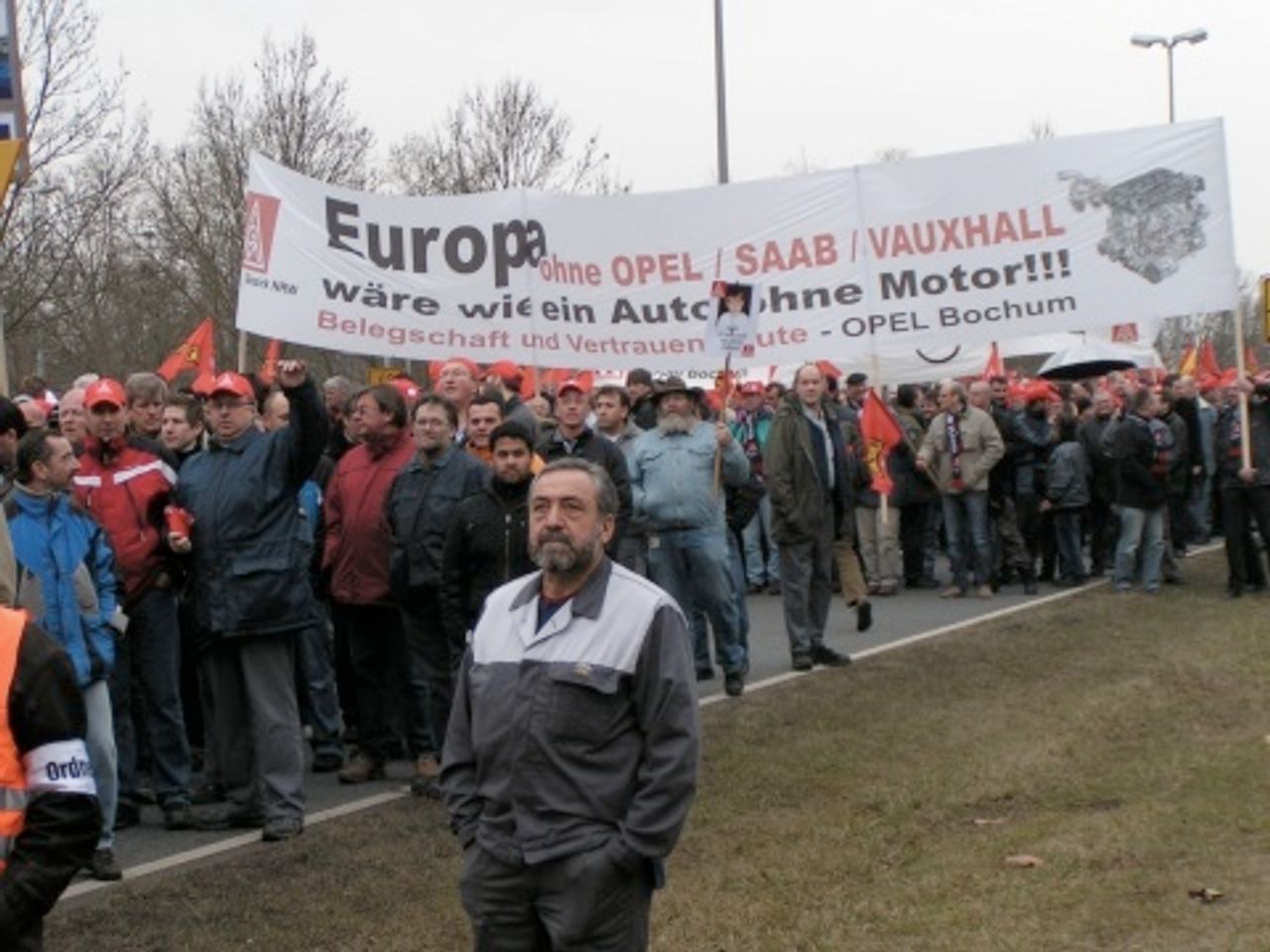 Demonstrators in Rüsselsheim
Demonstrators in RüsselsheimThe protesting workers, however, were merely used as a cover by the works councils and IG Metall (IGM) to advance a plan that had obviously been agreed with the government behind the scenes. One after the other at the Rüsselsheim rally, IGM Chairman Berthold Huber, the Works Council Chairman Klaus Franz and Vice-Chancellor Steinmeier declared that a separation of Opel and Vauxhall from GM and the setting up of a European concern was the "only viable solution."
The message was received and transported across the nation by the huge army of radio transmitters and television cameras on hand at the demonstration.
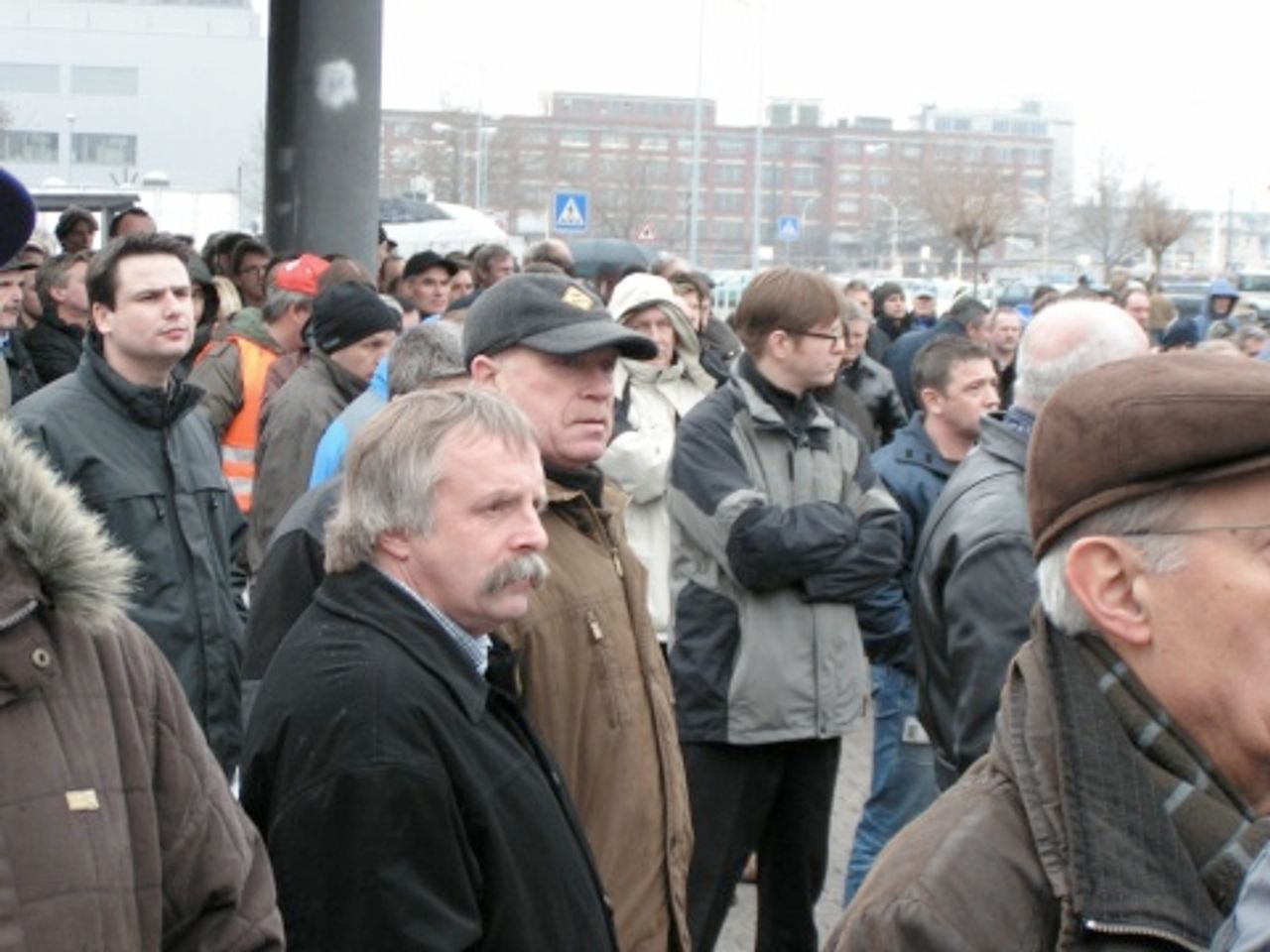 Workers listen to the speeches at the Rüsselsheim rally
Workers listen to the speeches at the Rüsselsheim rallyIn order to exclude any consideration of a combined struggle with GM workers in the US against the consequences of the international crisis in the auto industry, all of the speakers resorted to the nationalist tirades against GM.
IGM leader Huber declared it would be outrageous if Opel workers had to pay the price for the bad decisions and mismanagement at GM. According to Huber, the irresponsible managers and owners at GM were only interested in extracting short-term profit—implying that German managers worked on another principle. "We have had enough of playing the role of the extended arm of General Motors," Huber complained, arguing on this basis that Opel had to be separated from GM.
Steinmeier protested: "GM made good earnings at Opel for a long time, and it is indecent to now throw away the European locations like squeezed-out lemons."
The most extreme nationalism came from Works Council Chairman Franz. He accused GM of obscene arrogance, stating: "Opel is not the disaster, GM is the disaster." US losses had been shifted onto Europe, he said, and Opel had been systematically held back in past years and kept small. Car dealers in North Africa had been told to sell US-produced Chevrolets rather than Opel cars. GM lacked any foresight and also threatened to plunge Europe into the abyss.
None of the speakers mentioned that tens of thousands of GM workers in the US were losing their jobs as dozens of factories were closed, wages halved and massive cuts made to their health insurance and pensions. The speakers deliberately tried to divert the growing discontent on the part of German workers in a nationalist direction. Their "protest against Detroit" had two aims: to split a workforce that has cooperated for years in the same company, while at the same time closing ranks with the European management at Opel and Vauxhall, as well as the German government.
The trade unions and works councils propose founding a new company based on a merger of Opel and British concern Vauxhall in close collaboration with the government. The new company should receive endorsements and state investment, they argue, while at the same time opening itself up to new investors, e.g., Opel auto dealers.
Berthold Huber and Klaus Franz also advocate a form of "worker financial participation." On top of the wage cuts and job losses they will suffer, they propose that workers assist in bailing out the company by handing out a portion of their own savings.
After his tirade against GM, Klaus Franz even raised the prospect of GM participation in the new European company as a minority partner in order to achieve cost advantages in the purchase and transfer of technology and know-how.
All the speakers made clear that the creation of a new European-based company structure could only be profitable for shareholders if the workforce was prepared to make sacrifices. For their part, they gave assurances that they would endeavour to obtain such sacrifices from the workforce.
Klaus Franz stressed that there was no alternative to cuts, and that redundancies were unavoidable given the overcapacity in the European and worldwide automobile industry. Huber also told the assembled Opel employees that they should be prepared to make sacrifices and share the burden for the future of the company.
The general response of workers to the speeches was one of scepticism. They can recall countless rounds of "reconstruction packages," which in every case have led to huge losses accompanied by wage cuts and deteriorating working conditions.
Reporters for the World Socialist Web Site distributed a statement to the demonstrators titled "IG Metall und Betriebsrat spalten die Belegschaft von GM und Opel." ("German union seeks to divide European and North American GM workers") Many workers expressed opinions that varied greatly from those put forward by the politicians and trade union bureaucrats.
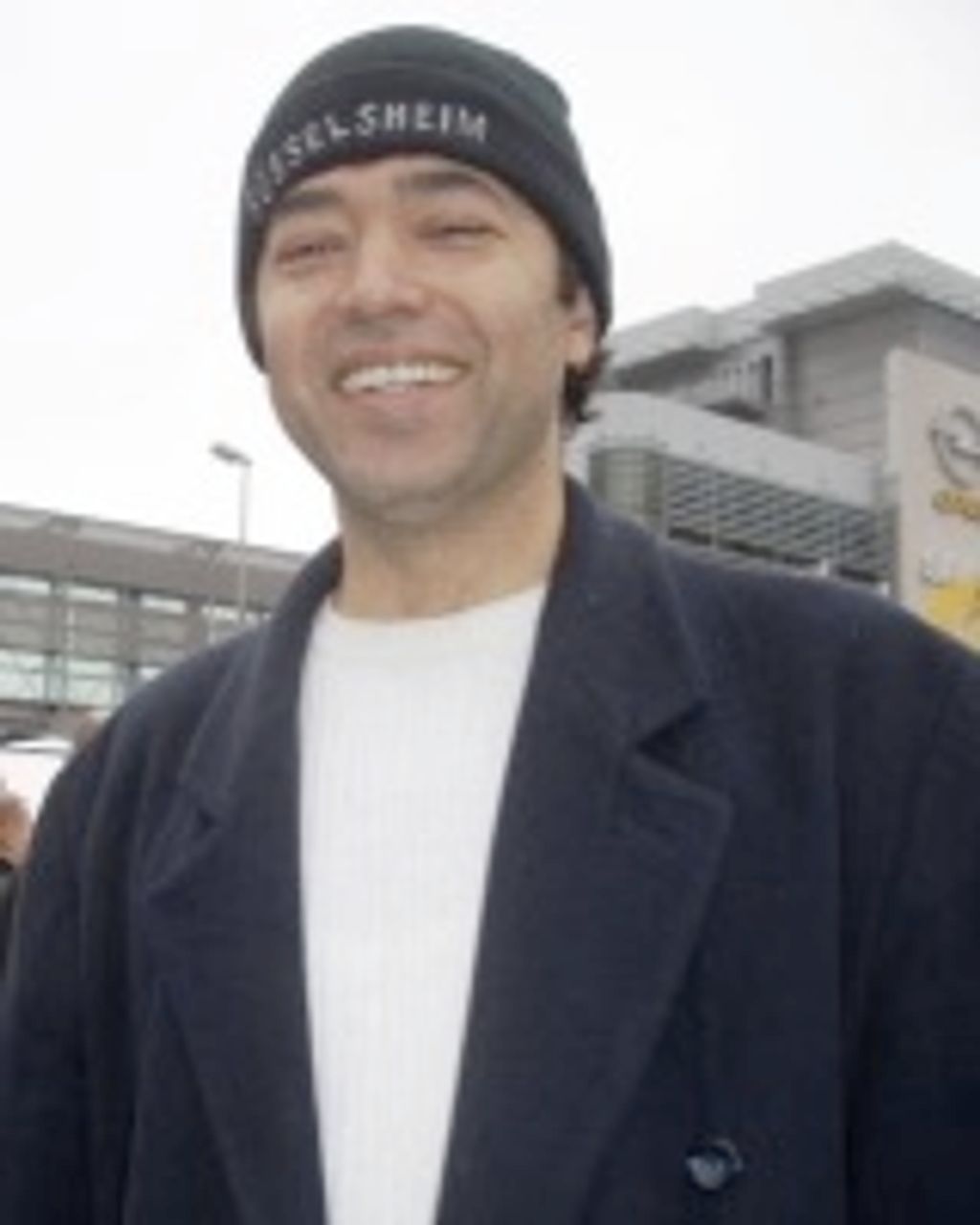 Tufan
TufanTufan has worked for some time at Opel. He said, "One cannot regard the working class on a national level. Irrespective of skin colour or nationality, whether I work in Germany or in America, we nevertheless share the same fate. We must respond like brothers. No worker has any influence on management decisions. The workers at General Motors in America cannot do anything if GM makes wrong decisions."
Tufan declared it was necessary to work together as an international trade union. Formerly the workers' movement had functioned internationally. "It is necessary for workers to organise themselves internationally," he said. "However this requires farsighted individuals, politically progressive thinkers capable of opposing capitalist ideology.
"The trade unions no longer have any progressive thinkers," Tufan added. "There have been no more honest politicians capable of organising the workers' movement since the murder of Rosa Luxemburg. We have allowed ourselves to be divided. During the past years we have suffered only defeats. We have been asleep. It is time for workers to wake up."
Many pensioners from Rüsselsheim participated in the demonstration to show their solidarity with their former colleagues. They spoke above all about the drastic reduction in staff levels that had already taken place.
One worker reported that he had begun work for Opel in 1955 and had worked for the company for 45 years. There had been hard times before, he related, "but nothing like the present state of affairs in the wake of the downward spiral of the world economy, which took off last October." He added, "At one time 48,000 workers worked here," and that these were full-time salaried employees, not contracted workers.
Another pensioner, who had worked 35 years at Opel, noted that of the current staff total of about 18,000 in the factory, only around one third are full-time production workers, with subcontracted workers forming a large percentage of the rest. "This development has taken off during the last 10 years, he said. "Previously it was not the case."
A younger worker told our reporters. "The subcontracted workers should be properly employed by Opel. Contract work should be banned. There should be the same pay for the same work."
When asked what the IG Metall did on behalf of subcontracted workers, he replied, "As they say, officially the IG Metall is not responsible for the subcontracted workers. In the meantime, the IG Metall has developed into an enterprise like any other. It has nothing in common with the IG Metall of former times. The union has not organised a proper strike since 1984. We are organised and pay contributions, but our money is used to gamble on the stock exchange. That is fundamentally wrong."
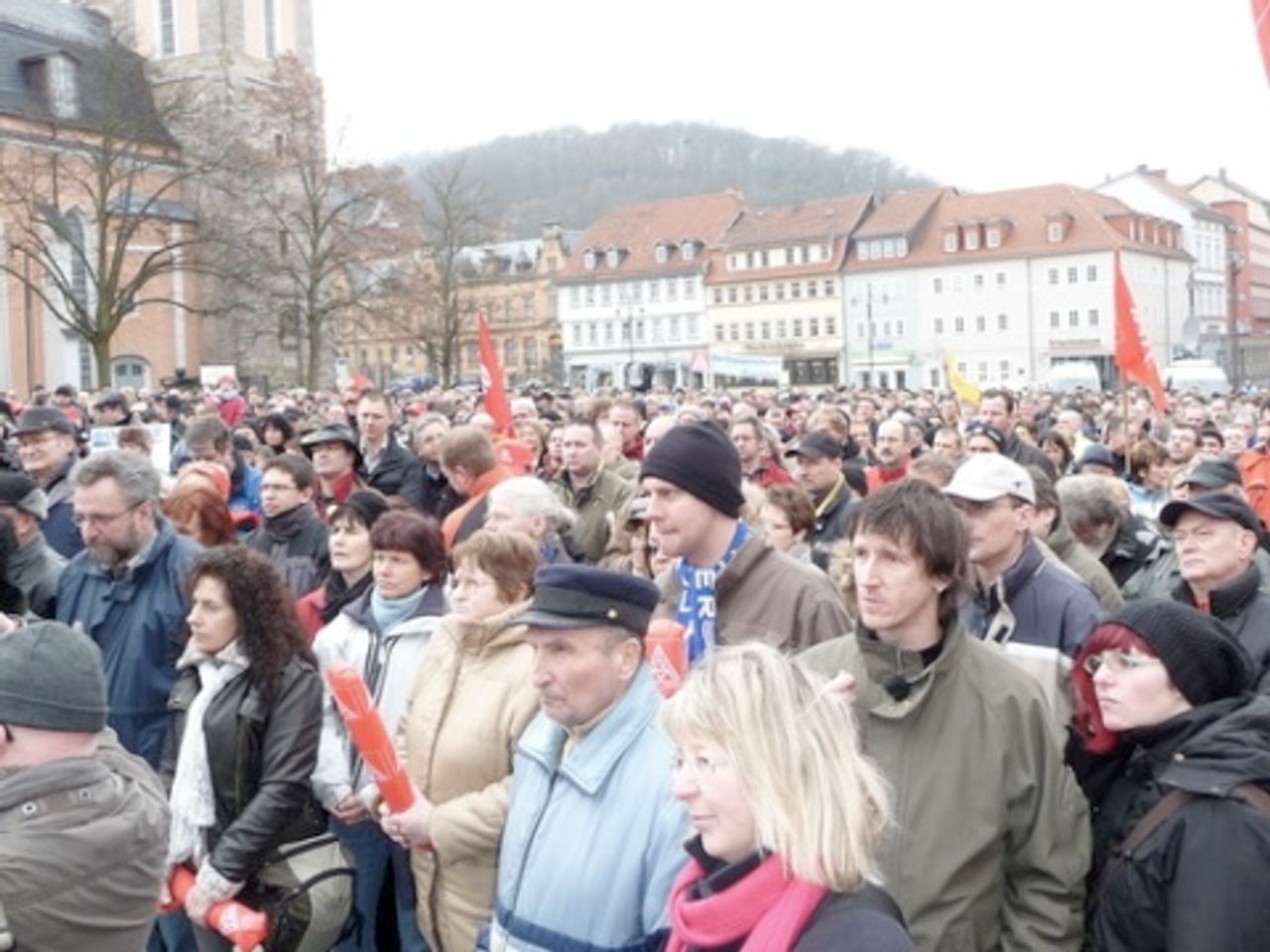 Day of action in Eisenach
Day of action in EisenachThe IG Metall had also organised a demonstration on short notice in the East German city of Eisenach as part of the so-called European Opel day of action. The demonstration held at the Eisenach marketplace was poorly attended. Just 1,000 took part, although the city's Opel factory has a total staff of about 1,800 workers. The factory is currently closed due to short-time working.
The demonstration had nothing to do with conducting a real fight to defend the jobs of all Opel and GM workers. Instead, many representatives of the press and radio had been invited to announce the "viable solution" proposed by the IG Metall. The workers in attendance were there to act as extras for the union. The speakers' platform was draped with Opel company flags rather than protest signs and banners.
Amongst the speakers were leading politicians from the state of Thuringia, including Christoph Matschie (SPD), and Bodo Ramelow (Left Party). Both men are competing for the office of prime minister at the next state elections. Speaking on behalf of the IG Metall was district leader Armin Schild, who sits on the Opel supervisory board, and Harald Lieske, the local works council chairman.
Both union bureaucrats sought to propagate the plan put forward some weeks ago by the IG Metall head Klaus Franz. Lieske stressed, "Only an independent Opel enterprise can and must function." He told the assembled workers, "Take your stance with Opel!" At the end of his speech, he warned, "Cuts and concessions are unavoidable," but said they should take place independently and not under pressure from GM in the US. In other words, the aim of the rally was to prepare Opel workers for the tough road ahead, for which there is allegedly no alternative.
WSWS reporters spoke with several Opel workers on the Eisenach demonstration. Reik Hahn, 39 years old, has worked at the plant in Eisenach since 1993. Opel began production in the town in 1992 and produces its Corsa model there. Hahn said, "One thing is clear, under capitalism companies will go to the wall if they do make enough profit. At the same time, we have witnessed everywhere in the past few years how the gap between managerial salaries and wages has continued to increase."
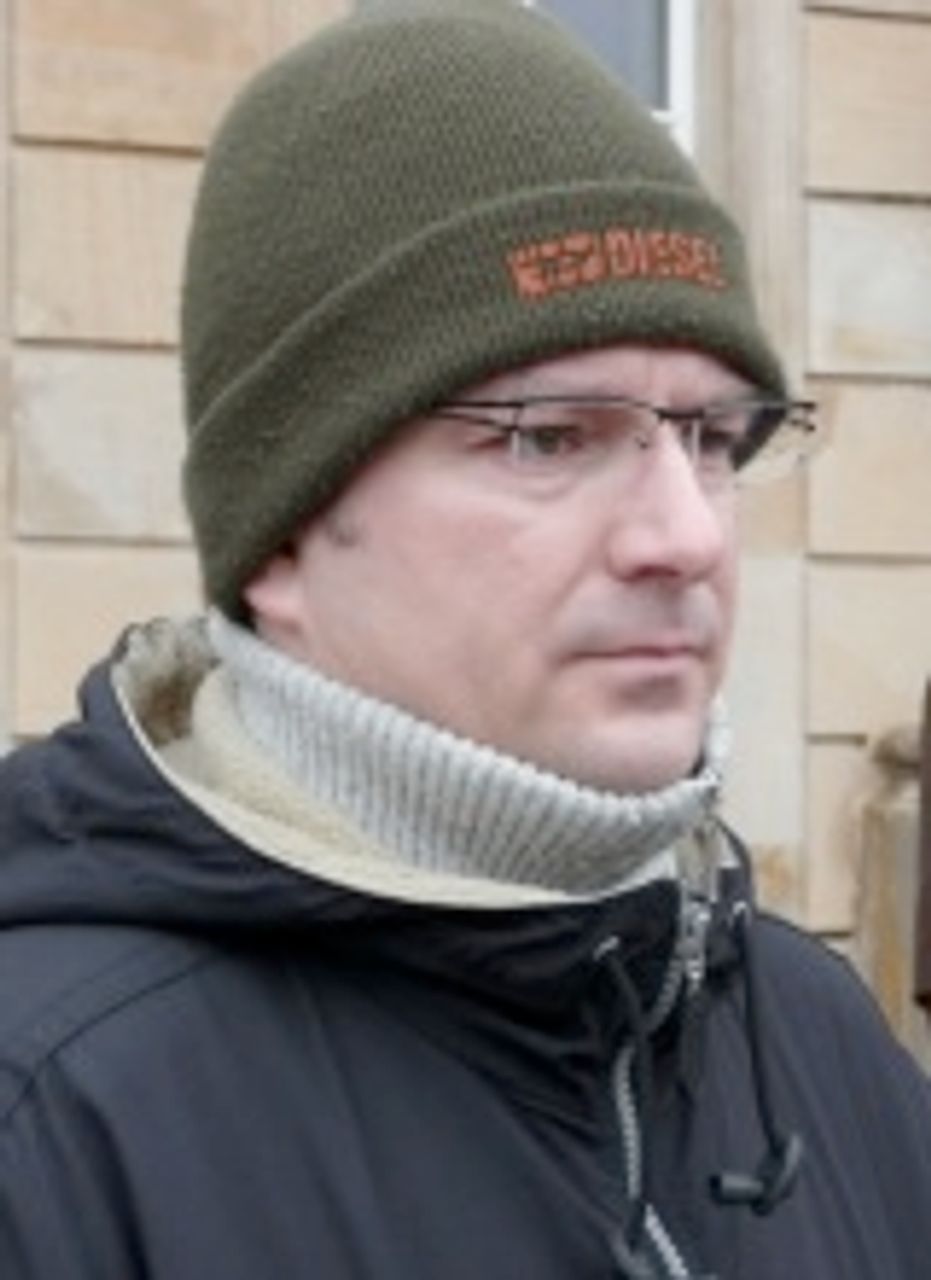 Reik Hahn
Reik HahnReik Hahn said he could not believe that a company with such a long tradition, and upon which so many other jobs depended, could be allowed to go bankrupt. "The executive committees of GM and Opel and those of the banks have been able to enrich themselves enormously, but are not prepared to make any sacrifices. I do not see why we should have to pick up the tab for everything. We are not responsible for this misery."
